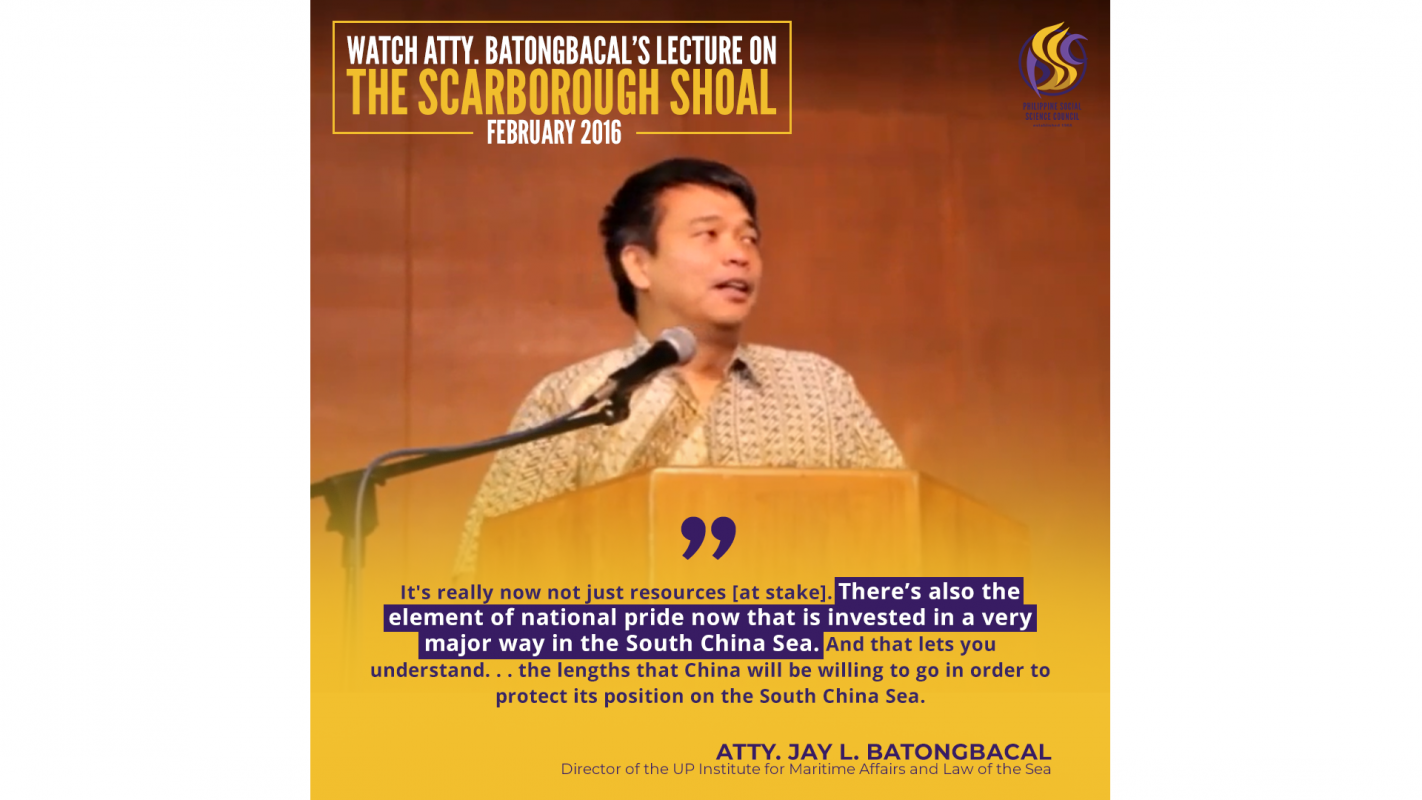Lecture on China’s Historical Claims to the South China Sea by Atty. Jay Batongbacal
- Posted on

In February 2016, Atty. Jay L. Batongbacal, the Director of the UP Institute for Maritime Affairs and Law of the Sea, delivered this four-part lecture on China’s historical claims to the South China Sea (SCS)—focusing on the Scarborough Shoal and tracing the factors and events that led to the standoff between the Philippines and China in 2012.
In the first part of his lecture, Atty. Batongbacal goes back to the nature of maps as mere human interpretations without legal force in the assertion of states’ territorial rights. He presented ancient maps illustrating China’s claims over the SCS and noted the anomalous arguments that were made based on these early documents.
The second part focused on the factors at stake in this territorial dispute. While the resources that lie within the area are undeniably of great interest to surrounding states, Atty. Batongbacal pointed out that national pride is also at play in this issue.
“It’s really now not just resources [at stake]. There’s also the element of national pride now that is invested in a very major way in the South China Sea. And that lets you understand. . . the lengths that China will be willing to go in order to protect its position on the South China Sea,” he said.
In the third part of the lecture, Atty. Batongbacal further unpacked the ambiguity of China’s arguments as it cited historical evidence but, at the same time, contradictorily invoked the United Nations Convention on the Law of the Sea (UNCLOS) in defending its claims. He then traced territorial disputes over the SCS from the first recorded claim made by the French in 1933 up to the case brought by the Philippines against China before the Permanent Court of Arbitration in 2013—a case that was later decided in favor of the Philippines in 2016.
The final part of the lecture looked into the Scarborough Shoal or Bajo de Masinloc in particular. Here, Atty. Batongbacal debunked China’s claims of first discovery and first naming of the shoal and laid down the supporting evidence for the Philippines’ opposing claims, with some even predating those presented by China.
In February 2016, Atty. Jay L. Batongbacal, the Director of the UP Institute for Maritime Affairs and Law of the Sea, delivered this four-part lecture on China’s historical claims to the South China Sea (SCS)—focusing on the Scarborough Shoal and tracing the factors and events that led to the standoff between the Philippines and China in 2012.
In the first part of his lecture, Atty. Batongbacal goes back to the nature of maps as mere human interpretations without legal force in the assertion of states’ territorial rights. He presented ancient maps illustrating China’s claims over the SCS and noted the anomalous arguments that were made based on these early documents.
The second part focused on the factors at stake in this territorial dispute. While the resources that lie within the area are undeniably of great interest to surrounding states, Atty. Batongbacal pointed out that national pride is also at play in this issue.
“It’s really now not just resources [at stake]. There’s also the element of national pride now that is invested in a very major way in the South China Sea. And that lets you understand. . . the lengths that China will be willing to go in order to protect its position on the South China Sea,” he said.
In the third part of the lecture, Atty. Batongbacal further unpacked the ambiguity of China’s arguments as it cited historical evidence but, at the same time, contradictorily invoked the United Nations Convention on the Law of the Sea (UNCLOS) in defending its claims. He then traced territorial disputes over the SCS from the first recorded claim made by the French in 1933 up to the case brought by the Philippines against China before the Permanent Court of Arbitration in 2013—a case that was later decided in favor of the Philippines in 2016.
The final part of the lecture looked into the Scarborough Shoal or Bajo de Masinloc in particular. Here, Atty. Batongbacal debunked China’s claims of first discovery and first naming of the shoal and laid down the supporting evidence for the Philippines’ opposing claims, with some even predating those presented by China.
In February 2016, Atty. Jay L. Batongbacal, the Director of the UP Institute for Maritime Affairs and Law of the Sea, delivered this four-part lecture on China’s historical claims to the South China Sea (SCS)—focusing on the Scarborough Shoal and tracing the factors and events that led to the standoff between the Philippines and China in 2012.
In the first part of his lecture, Atty. Batongbacal goes back to the nature of maps as mere human interpretations without legal force in the assertion of states’ territorial rights. He presented ancient maps illustrating China’s claims over the SCS and noted the anomalous arguments that were made based on these early documents.
The second part focused on the factors at stake in this territorial dispute. While the resources that lie within the area are undeniably of great interest to surrounding states, Atty. Batongbacal pointed out that national pride is also at play in this issue.
“It’s really now not just resources [at stake]. There’s also the element of national pride now that is invested in a very major way in the South China Sea. And that lets you understand. . . the lengths that China will be willing to go in order to protect its position on the South China Sea,” he said.
In the third part of the lecture, Atty. Batongbacal further unpacked the ambiguity of China’s arguments as it cited historical evidence but, at the same time, contradictorily invoked the United Nations Convention on the Law of the Sea (UNCLOS) in defending its claims. He then traced territorial disputes over the SCS from the first recorded claim made by the French in 1933 up to the case brought by the Philippines against China before the Permanent Court of Arbitration in 2013—a case that was later decided in favor of the Philippines in 2016.
The final part of the lecture looked into the Scarborough Shoal or Bajo de Masinloc in particular. Here, Atty. Batongbacal debunked China’s claims of first discovery and first naming of the shoal and laid down the supporting evidence for the Philippines’ opposing claims, with some even predating those presented by China.
